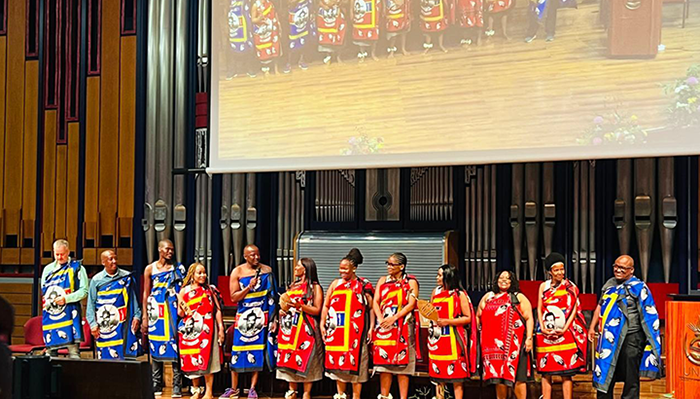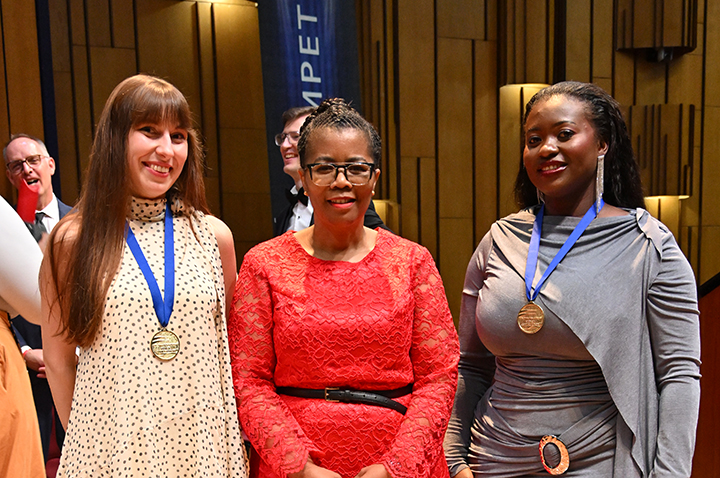
Equipped with state-of-the-art laboratories that provide students with hands-on experiences to bridge theory and practice

Participants and adjudicators
In celebration and recognition of academic staff who go beyond the expected in their teaching, learning and student support initiatives, Unisa’s College of Agriculture and Environmental Sciences (CAES) and College of Science, Engineering and Technology (CSET) recently hosted their impactful annual Teaching and Learning Festival.
The university's Senate Teaching and Learning Committee (STLC) has themed this year’s Teaching and Learning Festival "Going beyond the expected: unified uniqueness for student success!". The theme can be interpreted as fostering collaborative learning, viewing students as unique individuals with their own set of skills which need to be catered for, and fostering creativity, innovation and inclusiveness. All of this means that no student is left behind. In today’s evolving educational landscape, it is important to go beyond traditional means of teaching and learning and embrace innovative, student-centred and collaborative learning and teaching approaches that create an environment that nurtures creativity and innovation.
In her opening remarks, Prof Simiso Dube, Deputy Executive Dean of CSET, emphasised the significance of hosting festivals of this nature, stating that it’s about sharing new developments and best practices in teaching and learning, and celebrating those who are progressing and have the heart to explore new technologies for the support and success of the students. "We have to embrace technologies that are coming our way to enhance our teaching and learning; otherwise, we will be left behind and overtaken," she said. "There are several opportunities that the technologies are bringing forth, but we need to be cognisant also of the inherent challenges that the technologies come with and prepare ourselves to mitigate them, but develop students such that they are able to use technologies ethically," added Dube.

Prof Thabo Nkambule, keynote speaker
The keynote speaker at the Teaching and Learning festival was Prof Thabo Nkambule, the Head of the Institute for Nanotechnology and Water Sustainability (iNanoWS) at CSET. His address answered the question: Why does unified uniqueness matter? "It is because of the evolving complexity in higher education of our students," he said. "Student populations are increasingly diverse in culture, ability, learning styles and life circumstances, and so the traditional one-size-fits-all model fails to address this diversity effectively. As such, unified uniqueness embraces individuality, while fostering shared academic purpose," he added.
Participating in the festival under various categories were the following academic staff members:
After rigorous deliberations and reviews, the panel of adjudicators recommended that Ramanamane, Mushwana and Mamathaba will progress and compete at the institutional level of the Teaching and Learning Festival, which will take place on 22 September 2025. Some of the strengths cited by adjudicators from the college winners' presentations included good reflection of commitment to excellence in teaching, strong student support mechanisms infused, commendable use of digital tools, effective communication with students and the use of institutional policies to guide assessment and module development, to mention a few.
In closing, Prof Ashley Gunter, Deputy Executive Dean at CAES, congratulated all participants and highlighted the significance of ubuntu in teaching practices. He posed this question to the audience: "How do we approach our students in the spirit of ubuntu and take our teaching practice and make it a central part of what we do?" He added: "Remember, it’s not just a student number or mark, but a human being with a life, hope and a future that we at Unisa are engaged in."
* By Dr Nozipho N Madzivha, Communications and Marketing Specialist (acting), College of Science, Engineering and Technology.
Publish date: 2025/09/04
 Unisa celebrates a project of hope, dignity and student success
Unisa celebrates a project of hope, dignity and student success
 Women vocalists take top honours at Unisa's globally renowned showcase
Women vocalists take top honours at Unisa's globally renowned showcase
 African wealth is dependent on investment in education and development
African wealth is dependent on investment in education and development
 Unisa celebrates matric result success at Correctional Services ceremony
Unisa celebrates matric result success at Correctional Services ceremony
 Unisa ICT Director recognised among acclaimed IT leaders
Unisa ICT Director recognised among acclaimed IT leaders